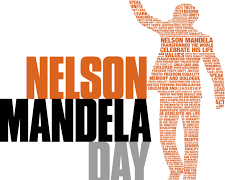NO ONE BETTER THAN BARACK OBAMA TO DELIVER HIS EXTRAORDINARY SPEECH AT MADIBA’S 100 ANNIVERSARY OF HIS BIRTHDAY…
BARACK OBAMA, a true President, a true Statesman that always leaves our nation proud wherever he goes, because he brings joy, love and laughter, but more than anything he raises RESPECT, for himself and for US…
THE WORLD LOVES OBAMA… Not so much Trump, and we witnessed that just a few days ago how despised and disrespected Trump’s around the world…
Trump, wherever he goes he brings shame to our nation, he’s an embarrassment to America…
Excerpt of Obama’s speech honoring & remembering Madiba’s lessons that also reminds us the kind of autocratic, racist, bigoted, xenophobic, full of hatred and divisionism government we’ve now in America, so, so far away, so different from Nelson Mandela’s concepts of society…
Reason why Madiba was so successful, Obama was so successful, reason why Trump’s administration is so chaotic, so untruthful, a huge failure in progress, unless he learns Madiba’s lessons of a more just, fair society, and a society based in compassion and humane empathy…
“I am not being alarmist, I’m simply stating the facts,” Obama said. “Look around — strongman politics are ascendant, suddenly, whereby elections and some pretense of democracy are maintained, the form of it, but those in powers seek to undermine every institution or norm that gives democracy meaning.”

“Madiba’s light shone so brightly, even from that narrow Robben Island cell, that in the late ‘70s he could inspire a young college student on the other side of the world to reexamine his own priorities, could make me consider the small role I might play in bending the arc of the world towards justice. And when later, as a law student, I witnessed Madiba emerge from prison, just a few months, you’ll recall, after the fall of the Berlin Wall, I felt the same wave of hope that washed through hearts all around the world.
Do you remember that feeling? It seemed as if the forces of progress were on the march, that they were inexorable. Each step he took, you felt this is the moment when the old structures of violence and repression and ancient hatreds that had so long stunted people’s lives and confined the human spirit – that all that was crumbling before our eyes. And then as Madiba guided this nation through negotiation painstakingly, reconciliation, its first fair and free elections; as we all witnessed the grace and the generosity with which he embraced former enemies, the wisdom for him to step away from power once he felt his job was complete, we understood that – we understood it was not just the subjugated, the oppressed who were being freed from the shackles of the past. The subjugator was being offered a gift, being given a chance to see in a new way, being given a chance to participate in the work of building a better world.”

“So on Madiba’s 100th birthday, we now stand at a crossroads – a moment in time at which two very different visions of humanity’s future compete for the hearts and the minds of citizens around the world. Two different stories, two different narratives about who we are and who we should be. How should we respond?
Should we see that wave of hope that we felt with Madiba’s release from prison, from the Berlin Wall coming down – should we see that hope that we had as naïve and misguided? Should we understand the last 25 years of global integration as nothing more than a detour from the previous inevitable cycle of history – where might makes right, and politics is a hostile competition between tribes and races and religions, and nations compete in a zero-sum game, constantly teetering on the edge of conflict until full-blown war breaks out? Is that what we think?
Let me tell you what I believe. I believe in Nelson Mandela’s vision. I believe in a vision shared by Gandhi and King and Abraham Lincoln. I believe in a vision of equality and justice and freedom and multi-racial democracy, built on the premise that all people are created equal, and they’re endowed by our creator with certain inalienable rights. And I believe that a world governed by such principles is possible and that it can achieve more peace and more cooperation in pursuit of a common good. That’s what I believe.
And I believe we have no choice but to move forward; that those of us who believe in democracy and civil rights and a common humanity have a better story to tell. And I believe this not just based on sentiment, I believe it based on hard evidence.”
“The fact that authoritarian governments have been shown time and time again to breed corruption, because they’re not accountable; to repress their people; to lose touch eventually with reality; to engage in bigger and bigger lies that ultimately result in economic and political and cultural and scientific stagnation. Look at history. Look at the facts.
The fact that countries which rely on rabid nationalism and xenophobia and doctrines of tribal, racial or religious superiority as their main organizing principle, the thing that holds people together – eventually those countries find themselves consumed by civil war or external war. Check the history books.
The fact that technology cannot be put back in a bottle, so we’re stuck with the fact that we now live close together and populations are going to be moving, and environmental challenges are not going to go away on their own, so that the only way to effectively address problems like climate change or mass migration or pandemic disease will be to develop systems for more international cooperation, not less.”
“First, Madiba shows those of us who believe in freedom and democracy we are going to have to fight harder to reduce inequality and promote lasting economic opportunity for all people.”
“And Madiba understood this. This is not new. He warned us about this. He said: “Where globalization means, as it so often does, that the rich and the powerful now have new means to further enrich and empower themselves at the cost of the poorer and the weaker, [then] we have a responsibility to protest in the name of universal freedom.” That’s what he said. So if we are serious about universal freedom today, if we care about social justice today, then we have a responsibility to do something about it. And I would respectfully amend what Madiba said. I don’t do it often, but I’d say it’s not enough for us to protest; we’re going to have to build, we’re going to have to innovate, we’re going to have to figure out how do we close this widening chasm of wealth and opportunity both within countries and between them.”
“Second, Madiba teaches us that some principles really are universal – and the most important one is the principle that we are bound together by a common humanity and that each individual has inherent dignity and worth.”
Madiba reminds us that: “No one is born hating another person because of the color of his skin, or his background, or his religion. People must learn to hate, and if they can learn to hate, they can be taught to love, for love comes more naturally to the human heart.” Love comes more naturally to the human heart, let’s remember that truth. Let’s see it as our North Star, let’s be joyful in our struggle to make that truth manifest here on earth so that in 100 years from now, future generations will look back and say, ‘they kept the march going, that’s why we live under new banners of freedom.’ Thank you very much, South Africa, thank you.
Full transcript of Obama’s Lecture on Madiba’s 100 Anniversary in South Africa, Johannesburg…




